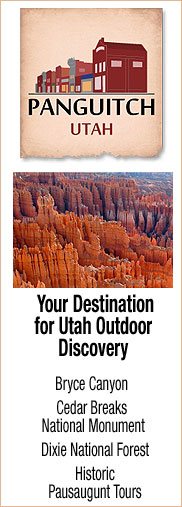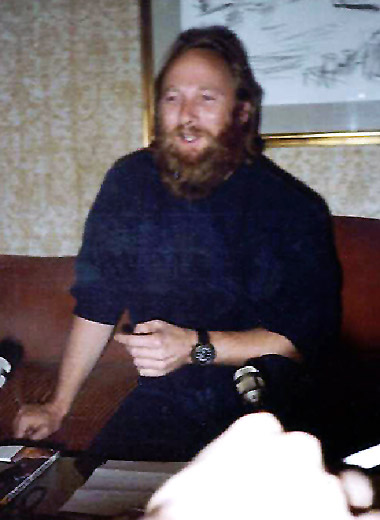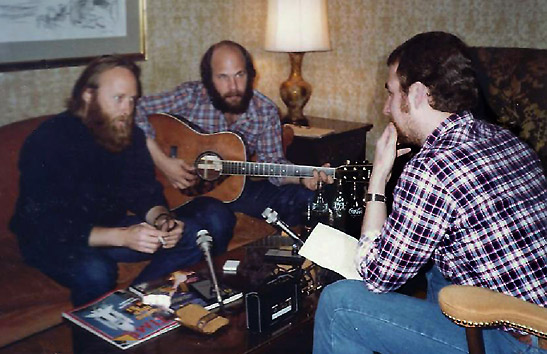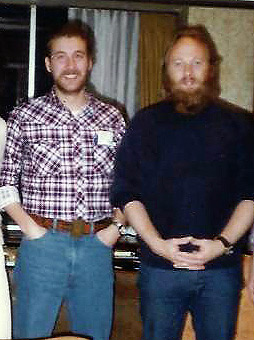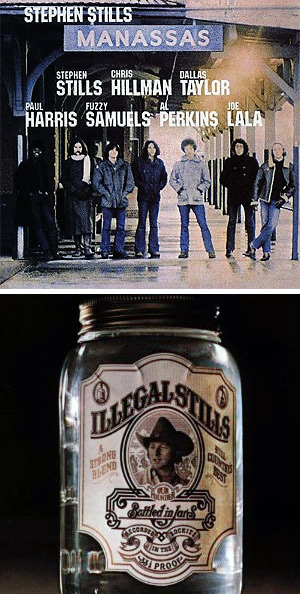 |
 |
|
 |

|
Stephen
Stills...
Stills has penned anthems that are instantly recognizable to multiple generations and lyrically just as relevant today as they were more than 40 years ago. His harmonies with Crosby, Nash and sometimes…Young are still in heavy rotation across Top 40 and Classic Rock radio, digital satellite channels, MY dentists' office and even the buildings elevator that takes me to her. Stills' dexterity on guitar speaks for itself; from studio sessions with Aretha Franklin and Jimi Hendrix to live concert venues that range from the peculiar Van Dyke Parks to the beautifully poetic, Judy Collins. Stephen Stills is a musical icon, occasionally outspoken and when he wants to be, a very funny guy. We started our conversation with his roots. "I was born in Texas and grew up in Louisiana and Florida…and then spent some time in Panama and Costa Rica." I know you did school time in Florida, but as a Political Science major? "Very, very little but I was there. (giggling) For the time I was there, I mean, just because I read," he laughs. "I guess you could call me a political science major and because my scores on my SAT's were real high in History and I could speak English…which was odd for the South." He's giggling, but shakes his head, "No, I didn't mean that. The thing that drew me to that of course was living in Latin America. To me, I still have a great fascination with inter-American and International Affairs. I've kept it up anyway and I still read a lot, even though I didn't go to school very much." From what I understand, you really started out playing a lot of folk music and performing in folk clubs, this was in Florida? "Yea, it was in Florida. I played in rock bands too. Don Felder from the Eagles as a matter-of-fact was in my first band. He played the lead guitar and I played rhythm and sometimes I would play drums. We were about 15. We used to work at schools and dances and stuff like that, so rock bands were really the first things that I did professionally. And after I got back from Latin America, I went to New York City and started working in folk clubs there." Greenwich Village type clubs? "Yea, passing the hat." What can you tell me about the Au Go Go Singers? "Uh…that's our skeleton that we try to hide. I used to call that my straight job. You know, because we would sing other people's arrangements and doing all the trite stuff, like the Serendipity Singers. I went up to Canada with this group and ran into Neil Young. I went back to handle the Embassy and all that… to get him a work permit and stuff. Well, he went to Toronto and decided to be a folk singer in the meantime. We were going to have a rock band see, so I didn't see him for a couple of years. And then I ran into him in L.A. and that meeting is what got the band together."
There's an incredible amount of folklore around that legendary chance meeting…. "Well, what happened…when I ran into Neil in Canada, it was in Thunder Bay, Ontario and he always used to drive this hearse. He had this big, old Pontiac hearse. No, it was a Buick, at the time. A big, old thing and it died while we were there. We had a funeral for it. Got all drunked up and pushed it over a cliff, (laughing) and said goodbye. 'Cause it died. I mean swallowed the rods, cracked the thing, it was just trashed...it was over for it, it was history. So that's when we parted company and he hitch-hiked into Toronto and I went back to get all the visa's together and everything. And about two years later I was in Los Angeles driving down the street and I see this hearse, a Pontiac this time, real classy looking thing with Ontario plates. I knew immediately who it was so I went, wah wah wah (Stephen's pushing his air steering wheel horn) and past the stop light we all got out and had a big laugh and therein lies the incredible true story of the Buffalo Springfield ladies and gentlemen, and you've heard it from the horse's mouth." Where did you get the name, Buffalo Springfield? "We stole a sign off a tractor that was kind of neat and we figured it'd look good right in the middle of the drum kit, so that was the name of the band 'cause it was the only sign that we had." Didn't you play with Van Dyke Parks at one time? "Yea, that was the ill-fated adventure of Van Dyke and Stephen in the city of Phoenix where we did a concert opening for the Lovin' Spoonful and it scared Van Dyke so bad you didn't see him again until he was back on Orange Grove Drive." This may be another skeleton, but you auditioned for the Monkees? "No, I went down to see them on a tip; I thought that maybe I could write some of their music for them. I never really wanted to be into television and all of that, but they started talking about it, and they were talking about using me and I went, 'wait a minute, wait, wait, wait…wait. I know a guy, you know, a friend of mine who'd be perfect. And I went and got Peter Tork for 'em." Well, you have to admit Michael Nesmith has some serious musical skills. "He's a pretty good country player, always was. Him…and what's-his-name? John Hartford. They are a lot alike. John Hartford does a fantastic thing with a fiddle and footstompin' music. You're musical associations seem to be all encompassing. John Sebastian… "I wanted to play bass for the Lovin' Spoonful, when I was in New York. But they got somebody else and that's what sent me to California as a matter-of-fact. Let's go back to the Springfield years for a minute. There were some personnel changes during its existence. "Yea, Bruce Palmer kept getting thrown out of the country, 'cause we could never get him together to go down to the damned Embassy. So he'd get too many tickets and get picked up by the cops and get thrown out of the country." (laughing) "It happened like three times." (still laughing) "It was terrible. And so finally he decided to stay up there, so we had to get somebody else and we ended up getting Jimmy (Messina)."
In early '67, you hit the charts with 'For What It's Worth.' Was that a little of your Political Science days coming to light? "Well, see I'd grown up in a couple of countries there where if you saw all the kids on one side of the street and all the cops on the other, you figured there'd be a change of government in a couple of days. And it struck me as kind of odd happenin' right here back in the good, ole U. S. of A. And being a young feller, you know, not too smart…actually, the level of naïveté is not too bad. It shows the IQ of at least... twelve!" It became an anthem of the times… "Everybody needed something to hang on to; I remember hearing stories about the boys in the Third up in 'I Corps' used to use that as a marching cadence. You know… Stop!" (Stephen snaps his fingers) "What's that sound? Everybody looks what's going down." (laughing) "And they'd sit around in their hooch's listening to that all the time, you know…back in the horrible days." In '68, Buffalo Springfield is no longer. What happened? "Well, it was a question of too much notoriety and not enough money. And so, we could never figure out if we were being stolen from…or lied to…or just too impressed with ourselves, so we just kind of…flew apart. And then I got together with David and Graham, and Neil went on to make a couple of albums on his own. We were just out there trying it, you know?" Is it true you were being considered as a replacement for Al Kooper in Blood, Sweat and Tears? "Yea, I got a call from a fella'… one of our bass players was Jim Fielder, he played with the Springfield for awhile and he was in this group Blood, Sweat and Tears. Al Kooper had quit and they were thinking about me for a time but it just never materialized and I was already on the way with David and Graham anyway so the timing was kind of bad. It would have been interesting, though." Speaking of Al Kooper, I'm a huge fan of 'Super Session.' "Yea, that was a LOT of fun. Eddie Hoh, the drummer was a good old friend of mine. And Al just called me and I said sure, I'll come and we came up with a couple of good pieces." It was like you were in the right place at the right time during that period, especially with session work. You were in the studio with Judy Collins… "Un-huh, we were living together in New York as a matter-of-fact. We did a lot of work together. I did some touring with her. I also was hanging around with Jimi Hendrix a lot. That's from the sublime to the ridiculous and BACK again. But we did some studio work together and I played on a couple of his records and he played on a couple of mine and we became fast friends around then too. Joni Mitchell. "Did some work with her; she was a good friend that David had introduced us all to. We knew she was going to be big. Did some work with Joanie Baez too and oh…lots of people. I did some work with Aretha. I got called in for a couple of those, because I guess I just happened to be in town, in New York. She ended up doing one of my tunes, she and Ray Charles which is really a feather for me. But at any rate, I got around a lot. It was a great way to meet people and play with all kinds of interesting cats, you know? And I still do it and other cats do it to. I got Herbie Hancock to play on a thing of mine just recently and we'd like to do some more together. He just told me to write some more. So I said I would. (laughing)
The formation of Crosby, Stills, Nash….& Young… "Well, Cass Elliot introduced us and it turns out Nash wanted to get into a more adventuresome group anyway so it just sorta' happened. And then we wanted another player later so… got Neil. And then that fell apart. That got to be crazy, I mean…" Probably one of the most recognizable and enduring songs ever written was Suite: Judy Blue Eyes. "I'd written…I had two lines and half a verse to one song and a whole other song and a whole beginning of another song so I stuck all three together one afternoon…sittin' around. Had a place in Sag Harbor, out on the end of Long Island and we were just trying to figure out what we were going to do and I got this idea to put these songs together. The only thing was they never released it as a single because it was so long. Which I never could figure out, because Dylan's 'Like a Rolling Stone' was like seven minutes long too, you know? But its neither here nor there, it was one of my better pieces that I'm still real proud of." The album Déjà Vu plugged in a little more. "That was some of Neil's influence and us having been on the road a little bit and played some rock and roll together. And we wanted to do some more electric. It kind of moved along at its own pace. Sometimes we'd get real fast and sometimes things would take forever. We were pretty much all business in the studio, though. If there were disagreements we'd leave them outside. There are a lot of rumors that float around about what our sessions were like, but our sessions were fairly business-like. We mostly experiment a lot and just try to find a new way of approaching things." You've played with such a diverse assortment of musicians, Aretha, Jimi Hendrix, the Au GoGo Singers… "I've also played with (Cuban composer and percussionist) Orestes Varona, too! (laughter) The live album, 4 Way Street…even the title seems to indicate a directional issue…. "By then we were hell-bent for leather in four different directions for sure. We pretty much knew that it was all over, but the singing for a little while…that everybody needed a rest from one another, you know? And sure enough that's what happened." You lived in Europe for a period of time? "Oh that was in '74. I got a place in England; I lived in about three places. A real beautiful place that I bought from Ringo Starr down in the country and that was a real pleasant year, a couple of years really. And I made some pretty good records in there." You had a few of your 'friends' sitting in on a number of your solo efforts, Rita Coolidge, Cass Elliot, John Sebastian, David Crosby, Graham Nash…and a cast of thousands? "Oh, Jesus… Eric (Clapton) was in there, Maynard Ferguson was in there…Golly, who else? Conrad Isadore and 'Fuzzy' Samuels and Ringo played on a couple of tracks. Jimi (Hendrix) played on one, and we recorded some other things together, too."
Then came…Manassas? "Well, Manassas…I just got sick of fighting it out on my own and decided to get another group, 'cause I couldn't make any sense out of any of the rest of this." (laughing) "So they all came over to England and we lived in this big old estate and put together a dynamite rock and roll band." Illegal Stills in '76. "We should have been put in JAIL!!!" (laughing) "The product seemed to start falling apart about that time. But there's some good, there's some good records in there." Thoroughfare Gap. "I kinda' liked that album. I liked it a lot more than the sales and I did some fairly adventuresome things and am responsible for a lot more than production. You know, the technical end of the production, I did most of the editing, mixing, mastering. I did most of that myself. And that's probably what I like best about it. But some of the arrangements are good… there's some good tunes in there, too. I'm pretty happy with that one." Dave Mason was on that album. "Yea, he helped me out a lot." Do you listen to a lot of music? "I listen to the radio in the car, all the time. Just to see what's going on, and there's lots of music that I really love." Give us your take on the music today? "Well, I think music has been asleep for about ten years and it's about time we woke up. And if it took these strange-looking groups to do it, more power to 'em. As long as they don't give up on us old boys, 'cause a few of us can really do it. And if you don't believe it, show up sometime, son. Might have a surprise fer ya.'" I think the word is prophetic. As you read this, Stills
has once again reunited with old friends, David Crosby and Graham Nash.
They have fresh, new material out this year and are currently midway
through a nation-wide summer tour. If you haven't been to a show recently,
or like me just waiting for the right one to see, check your
local concert venues for dates and times for this legendary trio…
just make sure your vehicle is in good running condition and find a
better hiding place for your tractor. |
|
|
![]()
Stay tuned.
This site is designed and maintained by WYNK Marketing. Send all technical issues to: support@wynkmarketing.com

|


